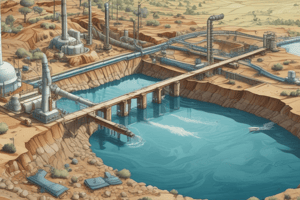Podcast
Questions and Answers
How does the Fixture Unit Table contribute to the determination of water pipe and meter sizes?
How does the Fixture Unit Table contribute to the determination of water pipe and meter sizes?
It helps determine the minimum fixture unit demand, which is then used to determine the required water pipe and meter sizes.
What is the significance of the 4-hour to 24-hour holding time in hydrotesting?
What is the significance of the 4-hour to 24-hour holding time in hydrotesting?
It allows for a thorough check of leaks and quality of pipe connections, ensuring the pipeline is safe for use.
What is the purpose of equivalent water supply fixture units in plumbing system design?
What is the purpose of equivalent water supply fixture units in plumbing system design?
To determine the minimum fixture unit demand, which is used to size water pipes and meters.
How do airgaps contribute to the overall safety of a plumbing system?
How do airgaps contribute to the overall safety of a plumbing system?
What is the primary purpose of performing hydrotesting as a final quality check?
What is the primary purpose of performing hydrotesting as a final quality check?
Study Notes
Introduction to Water Distribution System
- A water distribution system is a network that carries potable water from a treatment facility or water source to consumers for various purposes (residential, commercial, industrial, etc.)
- Consumers use water for:
- Drinking
- Cooking
- Washing
- Taking a bath
- Cleaning
- Irrigation
- Animal use
- Other commercial activities
Basic Principles of WSDS
- The quality of water should not deteriorate in the distribution pipes
- Water supply should have sufficient pressure heads
- Water supply should be enough during fire-fighting
- No customer should be without water supply during repair of any section
- All pipes should be laid 1 meter away or above the sewer lines
- Pipes should be water-tight to prevent leakage
Types of Water Distribution System
- Dead-end/Tree: Extended portion of a pipe is closed to which no connections are made
- Gridiron: Main supply line runs through the center of the building, and submains are interconnected
- Circular/Ring: Forms a ring of supply around the area, with branch pipes connected cross-wise to the mains and to each other
- Radial: The whole building is divided into several distribution areas, with each building having a centrally elevated reservoir
Plumbing Engineers
- Responsible for systems that serve all types of buildings (residential, commercial, industrial, public facilities, etc.)
- Should have knowledge about fixture selection and quality of fixtures
Rules of Potable Water
- Non-toxic materials should be used
- No cross-connection between private and public water supply system
- Water supply piping must never be directly connected to the drainage system
- Water supply must never be directly connected to embalming, mortuary, operating, or dissection tables
- No direct connection for pump priming
- No direct connections to sterilizers, aspirators, or similar equipment
- No back flow of water from water heaters/coolers/ or alike
- Air gap must be provided between overflow and water supply outlet
- Below-the-rim water supply connections must never be made
Components of Plumbing System
- Water Supply System
- Fixtures and appliances (sinks, bathtubs, showers, toilet, faucets, heater, washing machine, dishwasher)
- Drain system (system of pipes, fittings, and vents where waste water is directed towards the sewer)
Minimum Requirements
- Pipe Sizing
- Fixture Unit Table for determining water pipe and meter sizes
- Equivalent water supply fixture units (used to determine the minimum fixture unit demand)
- Pressure Drop
- Airgaps
- Flushometer
- Hydrotesting (final quality check before pipeline is placed in service, checks leaks and quality pipe connections, usually uses 40psi with holding time of 4 hours to 24 hours, approved as provided in section 501)
Studying That Suits You
Use AI to generate personalized quizzes and flashcards to suit your learning preferences.
Description
Test your knowledge on water distribution systems, including components, minimum requirements, and supply system plans. Learn about the importance of water distribution networks in providing potable water to consumers for various purposes.





